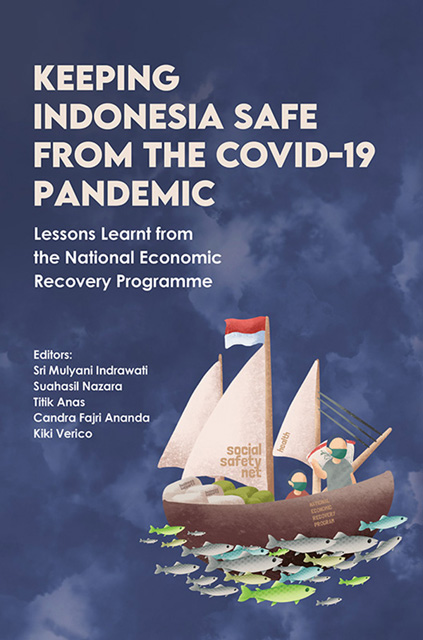 Keeping Indonesia Safe from the COVID-19 Pandemic
Keeping Indonesia Safe from the COVID-19 Pandemic Book contents
- Frontmatter
- Contents
- List of Figures
- List of Tables
- List of Boxes, Annexes and Appendixes
- Acknowledgements
- Glossary
- The Contributors
- Foreword: Keeping Indonesia Safe from the COVID-19 Pandemic Lessons Learnt from the National Economic Recovery Programme
- Part I Health Shock
- Part II Economic Shock: The Framework
- Part III Revenue Shock And Response
- Part IV Expenditure Side (Human Capital)
- Part V Expenditure Side (Msmes And Corporate Sector)
- Part VI Regional Dynamics
- Part VII New Ways Of Working
- Index
6 - Turning Bottlenecks into Breakthroughs
Published online by Cambridge University Press: 30 June 2023
- Frontmatter
- Contents
- List of Figures
- List of Tables
- List of Boxes, Annexes and Appendixes
- Acknowledgements
- Glossary
- The Contributors
- Foreword: Keeping Indonesia Safe from the COVID-19 Pandemic Lessons Learnt from the National Economic Recovery Programme
- Part I Health Shock
- Part II Economic Shock: The Framework
- Part III Revenue Shock And Response
- Part IV Expenditure Side (Human Capital)
- Part V Expenditure Side (Msmes And Corporate Sector)
- Part VI Regional Dynamics
- Part VII New Ways Of Working
- Index
Summary
INTRODUCTION
Rapid and frantic spread of the coronavirus disease at the beginning of 2020 has sent the world into chaos. Most countries were grappling with the deadly virus. Indonesia was no exception. Worse, it happened just as the government started to roll out that year's financial plans and prepare the 2019 accountability report.
Most government agencies were appalled and had no idea how to deal with the situation. Communities and business players too faltered because they had no experience in dealing with pandemics.
It was devastating, as the number of coronavirus patients continued to increase in some major cities, but government agencies could not respond immediately. One of the issues was budget constraints. The 2020 national and regional budgets were designed for a normal situation, not for the pandemic. Government officials were silent and reluctant to divert the existing budgets (APBN/APBD) to deal with the pandemic or for economic recovery. There was a growing fear that if such a condition is left unsettled, it could trigger a nationwide disaster.
The above situation indeed required the government's presence. But it failed to do so because government agencies were facing various constraints and obstacles. These include the absence of a legal framework for actions, regulations, programmes, budgets and business processes related to budget implementation in an emergency situation.
It was also not clear either which agency should be responsible for the matter. These were aggravated by invalid population data, ill-prepared human resources and inadequate digital information system, restrictions on people's movement, and the high number of employees and their family members who were exposed to COVID-19 (Chon and Kim 2022; Sundqvist-Andberg and Åkerman 2022).
The discussion also revolved around the role of Indonesia's National Disaster Management Authority (BNPB) which has mostly been dealing with natural disasters. On contrary, what the people facing was a pandemic that did not only impact health, but incurring social and economic problems. There was doubt whether BNPB is able to handle these issues. Also, existing laws only encompass natural disasters, and none are on nonnatural disasters. It prompted the Indonesian government to establish a Task Force led by the BNPB chief and its membership consists of ministries and government agencies.
- Type
- Chapter
- Information
- Keeping Indonesia Safe from the COVID-19 PandemicLessons Learnt from the National Economic Recovery Programme, pp. 185 - 210Publisher: ISEAS–Yusof Ishak InstitutePrint publication year: 2022


